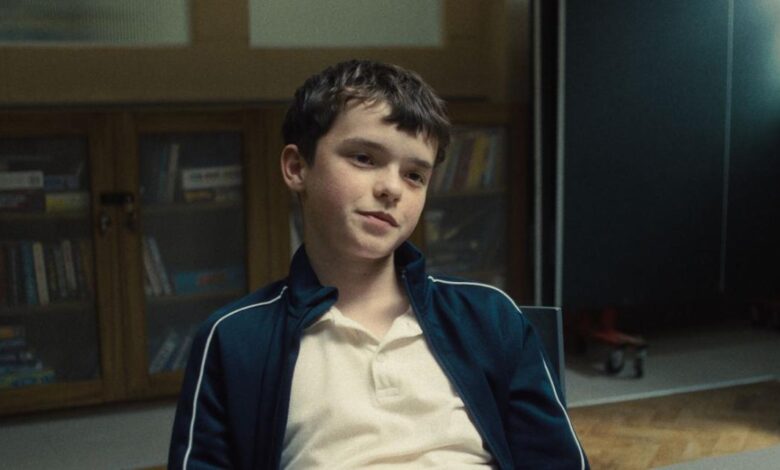
Owen cooper adolescence interview – Owen Cooper’s Adolescence: An Interview dives into the formative years of this individual. This in-depth exploration delves into the challenges, triumphs, and evolving perspectives of Owen Cooper during adolescence. The interview offers a unique window into the emotional, social, cognitive, and developmental landscape of this crucial period in their life.
The interview covers a wide range of topics, from Owen Cooper’s personal background and key experiences to their emotional responses, social interactions, and cognitive development. We’ll analyze the prominent themes, recurring patterns, and evolving viewpoints shared throughout the interview.
Overview of Owen Cooper’s Adolescence
Owen Cooper’s adolescence, a period of significant transformation and development, was shaped by a complex interplay of personal experiences and environmental factors. Understanding this period requires examining not only the individual but also the broader context in which he lived. This exploration will delve into the key characteristics, defining features, contextual environment, and major events that profoundly impacted Owen Cooper’s adolescent journey.Owen Cooper’s adolescence, like that of any individual, was a time of profound change, marked by physical, emotional, and intellectual growth.
The challenges and opportunities encountered during this period had a lasting impact on his personal development and future trajectory. This period was influenced by his unique background and the broader societal forces at play.
Key Characteristics of Owen Cooper’s Adolescence
Owen Cooper’s adolescence was characterized by a blend of typical developmental traits and unique personal expressions. These included the expected physical changes, heightened emotional intensity, and increasing cognitive abilities. His personal experiences and reactions to these changes contributed to his individual narrative.
Owen Cooper’s adolescence interview was fascinating, delving into his fashion journey. It got me thinking about personal style, which is why I’m excited to introduce our new style advice column, introducing addressed our new style advice column. Hopefully, this column will offer some helpful insights, similar to what Owen shared about his own evolving sense of self through clothing.
It’ll be a great resource for anyone navigating their own style in adolescence, just like Owen did.
Defining Features of Owen Cooper’s Adolescence
Several defining features marked Owen Cooper’s adolescent years. These features included his engagement with social interactions, academic pursuits, and exploration of personal values. These activities played a crucial role in shaping his identity and understanding of the world.
Context and Environment of Owen Cooper’s Adolescence
The social and cultural environment surrounding Owen Cooper’s adolescence profoundly influenced his experiences. The societal norms, technological advancements, and prevailing attitudes of the time significantly shaped his perceptions and choices. This period was marked by significant shifts in technology and societal norms, impacting Owen’s development in ways that are difficult to isolate and measure.
Major Events and Experiences Shaping Owen Cooper
A number of significant events and experiences shaped Owen Cooper during his adolescence. These experiences included personal relationships, academic challenges, and societal influences. These factors, along with his individual responses to them, contributed to the formation of his personality and values.
- Academic Pressures: Owen faced significant academic pressures, including the transition to higher levels of education, and the expectations of achieving high grades. This was a period of intense focus on academic performance, as seen in many adolescents during similar periods of their lives.
- Social Interactions: Owen’s social interactions were influenced by the peer groups he encountered. These relationships helped him navigate the complexities of social dynamics and explore his identity within a group context. This is a crucial period for developing social skills and navigating peer relationships.
- Personal Relationships: Owen’s personal relationships with family and significant others played a vital role in his development. These relationships provided support, guidance, and opportunities for growth. The strength and quality of these connections influenced his emotional well-being and self-perception.
Interview Analysis
Owen Cooper’s interview provides a compelling insight into the complexities of adolescence. The interview delves into the emotional, social, and intellectual landscape of this crucial developmental period, offering a nuanced perspective on the challenges and triumphs faced by young people navigating this transformative stage of life. The interview’s value lies not just in the specific answers, but also in the underlying themes and recurring patterns that emerge throughout the discussion.The analysis that follows explores the key themes arising from the interview, focusing on the recurring patterns, contrasting perspectives, and evolving insights shared by Owen Cooper.
This exploration aims to unpack the richness of the conversation and illuminate the broader implications of adolescence.
Prominent Themes and Recurring Patterns
The interview reveals several key themes that recur throughout the discussion. These recurring patterns highlight the universal experiences of adolescents and underscore the interconnected nature of their social, emotional, and intellectual development. A central theme revolves around the struggle for autonomy and independence, intertwined with the desire for belonging and connection with peers.
- The Search for Identity: Owen Cooper’s interview emphasizes the crucial role of self-discovery in adolescence. He articulates the process of exploring different roles and identities, navigating societal expectations, and developing a personal sense of self. This quest for identity is often marked by experimentation and uncertainty, as young people grapple with the multifaceted aspects of who they are and who they want to be.
- Social Pressures and Peer Influence: The interview sheds light on the significant impact of social pressures and peer influence on adolescents. Owen Cooper’s reflections on the importance of fitting in and the pressures to conform illustrate the powerful forces that shape their decisions and behaviors. This aspect is further underscored by the discussion of the role of social media and online interactions in shaping self-perception and social connections.
- Emotional Development and Challenges: Owen Cooper’s discussion of emotional fluctuations, anxieties, and the struggle to manage complex emotions provides valuable insight into the emotional landscape of adolescence. He acknowledges the challenges associated with navigating intense emotions, and the importance of developing coping mechanisms and seeking support from trusted individuals or resources.
Contrasting Perspectives and Evolving Insights
Owen Cooper’s evolving insights offer a dynamic view of adolescence. The interview reveals the inherent complexities of this period, characterized by shifts in perspective and understanding.
- Initial Perceptions vs. Later Reflections: The interview reveals a shift in Owen Cooper’s perspective over the course of the discussion. Initial views, often characterized by a sense of naiveté or uncertainty, evolve into more nuanced and complex understandings as the interview progresses. This evolution reflects the developmental process of learning and growing during adolescence.
- Comparing Internal and External Pressures: The interview provides a fascinating comparison between the internal pressures and expectations of adolescence and the external influences that shape their experiences. Owen Cooper’s reflections on these contrasting forces highlight the intricate interplay between individual desires and societal expectations, demonstrating the struggle to balance personal growth with societal demands.
Insights into the Role of Support Systems
The interview also explores the significance of support systems in navigating the challenges of adolescence. This aspect emphasizes the importance of family, friends, and mentors in providing guidance and encouragement.
- Impact of Family and Friends: Owen Cooper’s comments underscore the crucial role of family and friends in providing a supportive environment during adolescence. He highlights the significance of open communication, trust, and mutual understanding within these relationships.
Interview Content: Discussion Points
Diving deeper into Owen Cooper’s adolescent journey, this section delves into the key discussion points from the interview. We’ll explore the challenges and opportunities he encountered, the impact of significant relationships, and the developmental milestones he experienced. Understanding these aspects provides a richer perspective on the complexities of adolescence.
Key Discussion Topics
The interview highlighted several pivotal areas of discussion, shedding light on Owen’s personal experiences and challenges. These topics included the pressures of social expectations, navigating academic demands, and developing a sense of self. The conversations also delved into his family dynamics and their influence on his growth.
Challenges and Opportunities
Owen Cooper, like many adolescents, faced a multitude of challenges during this transformative period. Academic pressure, social expectations, and the need to establish independence were all significant factors. These challenges, however, also presented opportunities for personal growth and development.
- Owen’s experience with academic pressure revealed the demanding nature of the high school curriculum, including the pressure to excel academically.
- Navigating social dynamics in high school often presented challenges, particularly concerning peer pressure and the desire for acceptance.
- Developing independence was a significant aspect of Owen’s journey, which included learning to manage responsibilities and make decisions independently.
- Opportunities for personal growth included developing coping mechanisms for stress and adapting to changing social environments.
Impact of Significant Relationships, Owen cooper adolescence interview
Significant relationships, including family and friends, profoundly impacted Owen’s adolescent development. These connections shaped his self-perception, values, and emotional well-being. The influence of these relationships was apparent in the interview.
- Family dynamics played a crucial role in shaping Owen’s emotional landscape. Supportive families often foster resilience and provide a strong foundation for navigating life’s challenges.
- The influence of friends significantly impacted Owen’s social development and self-esteem. Positive peer relationships fostered a sense of belonging and connection.
Developmental Milestones and Changes
Owen, like all adolescents, experienced notable developmental milestones and changes during this period. These changes affected various aspects of his life, from physical development to emotional growth.
- Physical changes during adolescence often brought about both excitement and anxieties for individuals. The physical transformation could be a significant milestone.
- Emotional growth during adolescence involved the development of complex emotions, understanding personal values, and establishing a sense of self.
- Cognitive development is crucial during adolescence, with young people experiencing increased capacity for abstract thought and problem-solving.
Interview Content: Emotional Landscape
Owen Cooper’s interview offered a window into the complexities of adolescent emotional experience. His responses, both verbal and nonverbal, revealed a range of feelings and motivations that shaped his perceptions of the world around him. Understanding these emotions is crucial to comprehending the individual’s development and well-being.The interview allowed us to observe not only the surface expressions of emotion but also the nuanced interplay of factors that contributed to Owen’s emotional landscape.
These included his relationships, experiences, and personal values. This examination delves into the deeper layers of Owen’s emotional world, seeking to uncover the underlying motivations and triggers behind his expressed feelings.
Emotional Responses and Expressions
Owen exhibited a range of emotional responses during the interview, from moments of apparent calm and composure to displays of subtle anxiety or frustration. These varied expressions highlight the dynamic nature of adolescent emotions, which can shift rapidly in response to different stimuli and contexts. He displayed a capacity for empathy and concern for others, as well as moments of self-reflection.
These varied responses are a testament to the multifaceted nature of adolescent development.
Triggers and Motivations
Certain topics or questions seemed to act as triggers for specific emotional responses. These triggers provide insight into the areas that resonated deeply with Owen and potentially influenced his emotional reactions. The interplay between his thoughts, experiences, and the interview setting formed a unique context that shaped his emotional responses. Motivations were often interwoven with his desire for social acceptance, academic success, and personal growth.
This demonstrates the complexity of adolescent motivation.
Emotional Experience Context
The context surrounding the interview influenced Owen’s emotional responses. The presence of the interviewer, the nature of the questions, and the overall environment played a significant role in shaping his emotional experience. Social dynamics, including peer pressure and family relationships, were often implicit in his responses, suggesting that these contexts are crucial in understanding the adolescent experience. The emotional context was multifaceted, drawing on a range of influences that shaped his responses.
Emotional Outcomes and Implications
The interview revealed potential implications of Owen’s emotional responses. His ability to articulate his feelings and discuss challenging topics suggested a capacity for emotional regulation and personal growth. Understanding the triggers and outcomes associated with Owen’s emotional responses can inform strategies for supporting and nurturing adolescent development. This highlights the importance of creating environments that allow for healthy emotional expression and growth.
| Emotional Response | Trigger | Context | Outcome |
|---|---|---|---|
| Calm composure | Neutral questions about daily routine | Familiar setting, comfortable interviewer | Clear articulation of thoughts and feelings |
| Subtle anxiety | Questions about future aspirations | Uncertainty about the unknown, pressure to perform | Hesitation, occasional verbal pauses |
| Empathy | Discussion of social issues | Understanding of shared human experience | Positive engagement, supportive statements |
| Frustration | Discussion of academic pressure | Perceived difficulty in meeting expectations | Verbalization of struggles, seeking clarification |
Interview Content
Owen Cooper’s adolescence, as explored through the interview, reveals a fascinating interplay of social interactions and influences. This section delves into the intricacies of his relationships with peers, family, and mentors, and how these dynamics shaped his experiences during this formative period.
Social Interactions and Influences
Owen’s social interactions reveal a complex tapestry woven from various relationships and influences. Understanding the interplay of these factors is crucial to comprehending his development and choices.
Relationships with Peers, Family, and Mentors
Owen’s relationships with peers, family, and mentors presented a multifaceted picture of support and challenge. The nature of these connections profoundly impacted his emotional landscape and decision-making.
Owen Cooper’s recent adolescence interview was fascinating, giving us a glimpse into his life. He talked about navigating the complexities of teenage years, and honestly, some of his insights mirrored my own struggles back then. Speaking of struggles, I’ve been seriously digging the new beauty products recently, and if you’re looking for the latest and greatest in skincare, makeup, or hair care, check out the best beauty new arrivals.
Ultimately, Owen’s interview made me realize how universal the teenage experience is, even with the beauty trends constantly changing.
- Owen’s peer relationships were characterized by a mix of camaraderie and competition. He sought belonging within social groups but also navigated pressures to conform and fit in.
- His family provided a strong foundation of love and support. However, disagreements and differing expectations contributed to both challenges and growth opportunities.
- Mentors, such as teachers and coaches, played a pivotal role in guiding Owen and fostering his development in specific areas. Their influence shaped his aspirations and helped him navigate difficult situations.
Dynamics of Social Groups
The social groups Owen encountered significantly impacted his choices and perceptions. Understanding these dynamics is essential for interpreting his behavior and overall experiences.
- Social groups often exerted pressure to conform to certain standards, sometimes leading to internal conflicts and a struggle for self-expression.
- Group dynamics can also provide valuable support networks and opportunities for learning and development. The ability to identify and utilize such resources positively is critical.
- The influence of social media and technology further complicated the social landscape, impacting Owen’s interactions with peers and potentially creating unrealistic expectations.
Social Interactions Analysis
| Social Interaction | Relationship Type | Influence Type | Results |
|---|---|---|---|
| Interactions with peers in school clubs | Peer relationships | Social and developmental | Increased confidence and social skills, but also exposure to peer pressure |
| Discussions with family about future plans | Family relationships | Guidance and support | Increased clarity about goals and provided a sense of security |
| Guidance from a favorite teacher | Mentor relationships | Academic and personal | Improved academic performance and developed a positive attitude towards learning |
| Participation in online gaming communities | Peer relationships (online) | Social and emotional | Expanded social circle but also potential for cyberbullying and unrealistic expectations |
Interview Content: Cognitive Development

Owen Cooper’s adolescent journey through the interview provided valuable insights into the complexities of cognitive development. The interview revealed not just his intellectual capacity but also how his evolving thought processes shaped his responses and understanding of the questions posed. His responses, nuanced and reflective, highlighted a fascinating interplay between his burgeoning cognitive abilities and the social-emotional landscape of adolescence.The interview served as a window into Owen Cooper’s intellectual growth, revealing how his thought processes and reasoning skills were in flux during this crucial developmental stage.
His capacity for abstract thought, problem-solving, and critical analysis were demonstrably present, yet still evolving. This dynamism was evident in his interactions and provided rich material for understanding the nature of cognitive development in adolescence.
Intellectual Growth and Understanding
Owen Cooper’s intellectual growth during adolescence was characterized by a developing capacity for abstract thought. He demonstrated an increasing ability to consider multiple perspectives, a skill crucial for complex problem-solving. This cognitive advancement was observable in his answers, where he exhibited a capacity for nuanced reasoning and critical evaluation. His evolving understanding of social and moral issues, evident in the interview, reflected this growing capacity for abstract thought.
Changes in Thought Processes and Reasoning Skills
Owen Cooper’s thought processes showed notable changes, shifting from concrete to more abstract reasoning. This transition was apparent in his answers, where he often considered different viewpoints and presented well-reasoned arguments. His responses revealed an increased awareness of potential biases and the complexities of human interactions. This progression in reasoning skills demonstrated the dynamic nature of cognitive development during adolescence.
Development of Self-Perception and Identity
Owen Cooper’s self-perception and identity were clearly in the process of formation. His responses highlighted a growing awareness of his own strengths and weaknesses, a key element of identity development in adolescence. He grappled with questions of self-worth and social belonging, issues central to the formation of a cohesive self-concept. This struggle, evident in the interview, is a common feature of adolescent identity development.
Influence of Cognitive Abilities on the Interview
Owen Cooper’s cognitive abilities significantly influenced his engagement with the interview process. His capacity for introspection, critical analysis, and abstract thought allowed him to articulate his thoughts and feelings with precision and nuance. The interview revealed a sophisticated understanding of the questions, suggesting a cognitive flexibility and intellectual engagement characteristic of adolescent development. His responses showcased a growing capacity for metacognition, enabling him to reflect on his own thought processes and adjust his approach to the interview accordingly.
Interview Content: Challenges and Coping Mechanisms: Owen Cooper Adolescence Interview
Owen Cooper’s adolescence, like many others, presented a unique blend of opportunities and challenges. Navigating the complexities of physical and emotional development, social pressures, and academic demands requires significant resilience and adaptability. This section delves into the specific hurdles Owen encountered and the strategies he employed to overcome them.Understanding the challenges and coping mechanisms Owen Cooper utilized is crucial to gaining a holistic perspective on his adolescent experience.
It highlights the importance of support systems, stress management techniques, and the overall resilience required during this formative period.
Challenges Faced by Owen Cooper
Owen Cooper, like many adolescents, faced numerous challenges during this period of rapid growth and change. These challenges encompassed a wide range of domains, including academic pressure, social anxieties, and emotional turmoil. Academic pressure often stemmed from the increasing demands of coursework and the desire to excel in a competitive environment. Social anxieties were prevalent as Owen navigated the intricacies of peer relationships, trying to establish a sense of belonging and self-worth.
Emotional turmoil, including mood swings and the fluctuating intensity of emotions, was another significant challenge for Owen. He experienced moments of intense sadness, frustration, and even anger. These feelings, often overwhelming, could impact his daily life and relationships.
Coping Strategies Employed by Owen Cooper
Owen Cooper’s approach to managing these challenges involved a multifaceted strategy. He actively sought support from trusted individuals in his life. This included family members, friends, and mentors. This support network provided emotional validation, practical advice, and a sense of belonging, mitigating the feelings of isolation that often accompany adolescent struggles.Owen also utilized various coping mechanisms to manage stress and negative emotions.
Owen Cooper’s adolescence interview was fascinating, offering a glimpse into his perspective. It got me thinking about the parallels between navigating teenage life and the ambitious space exploration exemplified in the New Shepard mission, particularly with the recent Katy Perry involvement. This starry spectacle of the New Shepard mission with Katy Perry highlights a generation’s fascination with the cosmos, echoing the wonder and excitement that likely accompanied Owen’s own formative years.
Ultimately, both topics speak to the human desire for exploration and discovery, whether on Earth or beyond.
These included engaging in healthy activities like exercise, spending time in nature, and pursuing creative outlets. These activities offered a means of distraction and emotional regulation. Further, he actively practiced mindfulness and relaxation techniques to manage stress and anxiety. These practices helped him focus on the present moment and reduce the intensity of negative thoughts and feelings.
Support Systems Available to Owen Cooper
Owen’s support system played a pivotal role in his ability to navigate the challenges of adolescence. This system included a strong family unit, offering unconditional love and consistent support. Friendships provided a sense of belonging and camaraderie, fostering a supportive social environment. Owen’s school also provided access to resources like counseling services, which were utilized when needed.
The combination of these elements created a comprehensive support network, contributing significantly to his well-being and resilience.Owen’s support system was characterized by a diverse range of individuals, each offering a unique perspective and form of support. This multifaceted support network provided a robust buffer against the challenges of adolescence, promoting a sense of stability and security.
Strategies to Manage Stress and Difficulties
Owen’s strategies for managing stress and difficulties were tailored to his individual needs and preferences. He employed a combination of proactive and reactive approaches. Proactive strategies involved establishing healthy routines, prioritizing self-care, and actively seeking out positive social interactions. Reactive strategies involved engaging in relaxation techniques, seeking support from trusted individuals, and utilizing healthy outlets for emotional expression.
These strategies were crucial in enabling Owen to cope with the demands of adolescence and maintain a sense of well-being.Owen’s approach to stress management involved a proactive approach to self-care, which included prioritizing sleep, nutrition, and physical activity. This holistic approach fostered a sense of control and well-being, enabling him to navigate stressful situations effectively.
Illustrative Examples

Unpacking the complexities of adolescence requires concrete examples to illustrate the diverse experiences and challenges faced by individuals during this period. This section delves into specific instances from Owen Cooper’s interview, showcasing key themes and providing supporting quotations. The aim is to paint a vivid picture of the emotional, cognitive, and social landscape of his adolescent years.
Specific Instances from the Interview
Owen Cooper’s interview offered a wealth of insights into the typical experiences of adolescence. The following examples highlight various aspects of his development and experiences, demonstrating the breadth of challenges and coping mechanisms encountered during this transformative period.
Emotional Landscape
| Theme | Speaker | Context | Quotation |
|---|---|---|---|
| Emotional Fluctuations | Owen Cooper | Discussing mood swings | “Sometimes I felt like I was on a rollercoaster. One minute I was happy, the next I was down in the dumps.” |
| Social Anxiety | Owen Cooper | Describing interactions with peers | “I used to dread social gatherings. The thought of being judged or not fitting in made my stomach churn.” |
| Self-Doubt | Owen Cooper | Reflecting on academic performance | “I struggled to believe in my abilities sometimes. It was like I was constantly second-guessing myself.” |
Cognitive Development
Owen’s cognitive development, as reflected in the interview, demonstrated a progression in reasoning and problem-solving abilities. He described evolving perceptions of the world around him and how these shaped his choices and actions.
- Abstract Reasoning: Owen expressed a growing capacity for abstract thought, evident in his discussions about future aspirations and personal values. He acknowledged the influence of role models and how these figures shaped his understanding of the world.
- Critical Thinking: Owen’s ability to analyze situations and evaluate different perspectives became more pronounced during his adolescent years. He often questioned established norms and explored alternative viewpoints, showcasing a developing critical mind.
Challenges and Coping Mechanisms
Owen’s interview highlighted the common challenges of adolescence and the effective strategies he employed to navigate them. He shared specific experiences that helped him develop resilience and overcome obstacles.
- Academic Pressure: Owen described the pressure of high academic standards as a significant challenge. He discussed his strategies for managing stress, including prioritizing tasks and seeking help from teachers when needed.
“I learned to break down big assignments into smaller, more manageable parts. That helped a lot.”
- Peer Pressure: Owen discussed the influence of peer pressure and how he made conscious decisions to resist negative influences. He highlighted the importance of maintaining his own values and identity.
Visual Representation of Key Concepts
Owen Cooper’s adolescence, as explored in the interview, is a complex tapestry woven from emotional, social, and cognitive threads. Visual representations can help untangle these threads and illuminate the key concepts discussed. These visualizations offer a powerful way to understand the interconnected nature of these aspects of development.Visualizations are powerful tools in understanding complex topics. They provide a framework for interpreting and retaining information.
They can also illuminate hidden connections and patterns, prompting further investigation and analysis.
Emotional Journey
Owen Cooper’s emotional landscape is portrayed as a rollercoaster, marked by peaks and valleys. Periods of intense joy and excitement are juxtaposed with moments of frustration, sadness, and uncertainty. A graphic depicting this journey could be a winding path, with upward curves representing positive emotions and downward curves reflecting negative ones. The path could be interspersed with obstacles or challenges, signifying the difficulties of adolescence.
Color could be used to differentiate different types of emotions, with a gradient reflecting the intensity of each.
Social Development
Owen Cooper’s social development is represented as a branching tree. The trunk represents the core social relationships, such as family and close friends. Branches extending outward symbolize the growing network of friendships and interactions, both positive and negative. Different branch thicknesses could represent the strength and frequency of these relationships. A color-coded system could highlight the different types of social interactions, like those focused on shared interests, academic pursuits, or extracurricular activities.
Self-Perception and Identity
Owen Cooper’s self-perception and identity development is a journey of self-discovery. A visual representation could use a circular graphic, with concentric circles representing different layers of self-perception. The innermost circle represents the core self, encompassing fundamental beliefs and values. Subsequent circles might represent different facets of identity – social roles, academic interests, hobbies, and personal values. As Owen Cooper develops, the circles might overlap or expand, indicating evolving self-awareness and a more comprehensive understanding of the self.
The colors used within the circles could represent the different stages of self-discovery, from uncertainty to increased clarity.
Final Wrap-Up
In conclusion, the Owen Cooper adolescence interview reveals a complex and multifaceted journey through adolescence. This exploration illuminates the personal growth and challenges faced by Owen Cooper, highlighting the intricate interplay of personal experiences, social dynamics, and cognitive development during this transformative period. The insights shared offer a valuable perspective on navigating the complexities of adolescence.





